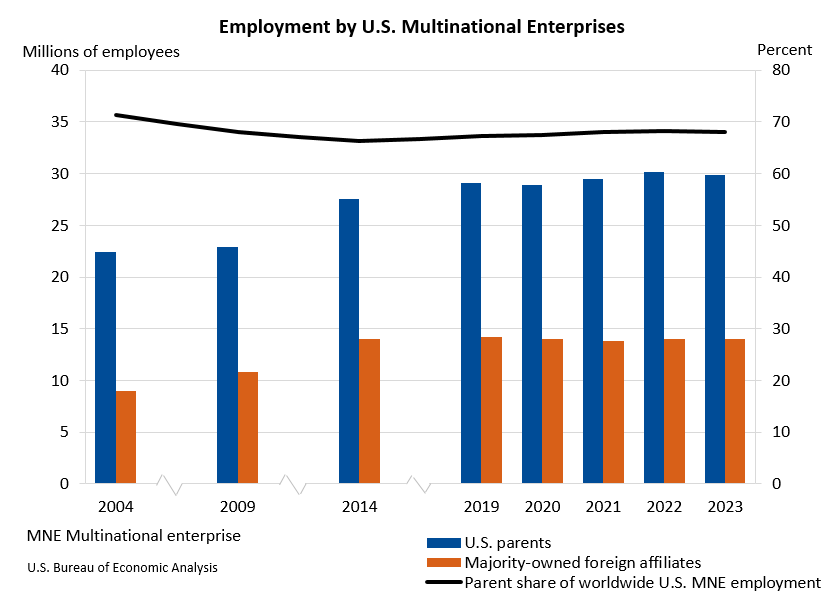Bureau of Economic Analysis
Activities of U.S. Multinational Enterprises, 2023
Worldwide employment by U.S. multinational enterprises decreased 0.4 percent to 43.9 million workers in 2023 (preliminary) from 44.1 million workers in 2022 (revised), according to statistics released today by the U.S. Bureau of Economic Analysis on the operations and finances of U.S. parent companies and their foreign affiliates.
Principal Federal Economic Indicators
Noteworthy
- 2025 News Release Schedule
- Innovation at BEA
- 2025 Annual Updates
- Distribution of Personal Income Nowcast
- New! Services Trade Data for More Countries
- Data Tool: Trade in Value Added
- Updated: RIMS II Regional Multipliers
- Arts and Culture
- Space Economy
- FDI Now in State BEARFACTS
- Quick Guide: Price Indexes
The Latest
Gross Domestic Product for the CNMI, 2019
The estimates of GDP for the CNMI show that real GDP—GDP adjusted to remove price changes—decreased 11.2 percent in 2019 after decreasing 19.3 percent in 2018 (table 1.3).
Gross Domestic Product for the CNMI, 2019
Today, the Bureau of Economic Analysis (BEA) is releasing estimates of gross domestic product (GDP) for the Commonwealth of the Northern Mariana Islands (CNMI) for 2019, in addition to estimates of GDP by industry and compensation by industry for 2018. These estimates were developed under the Statistical Improvement Program funded by the Office of Insular Affairs (OIA) of the U.S. Department of the Interior.
U.S. International Investment Position Fourth Quarter 2020
The U.S. net international investment position, the difference between U.S. residents’ foreign financial assets and liabilities, was –$14.09 trillion at the end of the fourth quarter of 2020, according to statistics released by the U.S. Bureau of Economic Analysis (BEA). Assets totaled $32.16 trillion and liabilities were $46.25 trillion. At the end of the third quarter, the net investment position was –$13.86 trillion.
U.S. International Investment Position, Fourth Quarter and Year 2020
The U.S. net international investment position, the difference between U.S. residents’ foreign financial assets and liabilities, was –$14.09 trillion at the end of the fourth quarter of 2020, according to statistics released by the U.S. Bureau of Economic Analysis (BEA). Assets totaled $32.16 trillion and liabilities were $46.25 trillion. At the end of the third quarter, the net investment position was –$13.86 trillion.
Arts and Cultural Production Satellite Account, U.S. and States
The Arts and Cultural Production Satellite Account released today by the U.S. Bureau of Economic Analysis (BEA) shows that arts and cultural economic activity, adjusted for inflation, increased 3.7 percent in 2019 after increasing 2.3 percent in 2018. Arts and cultural economic activity accounted for 4.3 percent, or $919.7 billion, of current-dollar gross domestic product (GDP), in 2019.
Arts and Cultural Production Satellite Account, U.S. and States
The Arts and Cultural Production Satellite Account released today by the U.S. Bureau of Economic Analysis shows that arts and cultural economic activity, adjusted for inflation, increased 3.7 percent in 2019 after increasing 2.3 percent in 2018. Arts and cultural economic activity accounted for 4.3 percent, or $919.7 billion, of current-dollar gross domestic product, in 2019.
Gross Domestic Product by State, 4th Quarter 2020
Real gross domestic product (GDP) increased in all 50 states and the District of Columbia in the fourth quarter of 2020, as real GDP for the nation increased at an annual rate of 4.3 percent. The percent change in real GDP in the fourth quarter ranged from 9.9 percent in South Dakota to 1.2 percent in the District of Columbia.
Gross Domestic Product by State, 4th Quarter 2020 and Annual 2020 (Preliminary)
Real gross domestic product (GDP) increased in all 50 states and the District of Columbia in the fourth quarter of 2020, as real GDP for the nation increased at an annual rate of 4.3 percent. The percent change in real GDP in the fourth quarter ranged from 9.9 percent in South Dakota to 1.2 percent in the District of Columbia.
Personal Income and Outlays, February 2021
Personal income decreased $1,516.6 billion, or 7.1 percent at a monthly rate, while consumer spending decreased $149.0 billion, or 1.0 percent, in February. Economic impact payments associated with the Coronavirus Response and Relief Supplemental Appropriations (CRRSA) Act of 2021 (which was enacted on December 27, 2020) declined sharply in February and unemployment benefits continued, but at a lower level.
Personal Income and Outlays, February 2021
Personal income decreased $1,516.6 billion, or 7.1 percent at a monthly rate, while consumer spending decreased $149.0 billion, or 1.0 percent, in February.




